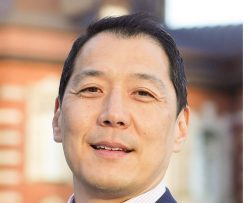10:59 JST, January 30, 2022
How will political developments and technological progress in Japan and overseas change our daily lives in the future? How much wisdom and information do we need to answer this question? And to what extent is the information reliable if it is unilaterally provided?
A few years ago, a book titled “Factfulness,” which was highly praised by Bill Gates and former U.S. President Barack Obama, became a best seller. It was written by Hans Rosling, a Swedish statistician and professor of public health, and two coauthors. The book is enlightening, as it vividly shows why people tend to be influenced by “preconceptions” based on information provided by people who are experts only within their limited field or by media outlets that do not want to antagonize their readers.
People tend to feel excessively afraid of things that are not that dangerous, instantly make generalizations based on only one case — or, conversely, apply a general theory to an individual matter — and believe that looking for someone to blame leads to “solving problems.” All these attitudes are dangerous, the book warns.
Likewise, given that people now are definitely better off economically than a century ago, it is puzzling that the pessimistic idea persists that there has been a sharp increase in the number of people living in poverty. When we compare the Great Depression that devastated the world economy in the 1930s and the international recession in the wake of the global financial crisis of 2007-08 in terms of how miserable people’s living conditions were, it is clear that such pessimism is based on biased information.
So, how should we calmly determine what kind of situation we are in, while distinguishing between cases that are essentially individual episodes and broader statistical information concerning a holistic issue?
Needless to say, we should not seek quick resolutions by relying on a single yardstick. For instance, discussions about the economy should not end after looking at just gross domestic product data. While economic growth improves people’s lives, a policy that sets such growth as practically its sole objective is likely to end up making policymakers less sensitive to non-economic factors related to well-being. On the other hand, a society that aims to forsake growth-oriented economic policy is likely to eventually compel its people to live with deficiencies and discomfort.
In reality, there can be no doubt that it is those people Adam Smith collectively described as the “weak man” — those who are driven by pride, vanity and ambition and who prioritize what the public thinks of them — who act as the engine for the development of a commercial society, enabling many other people to receive its benefits. Nonetheless, society also needs those who, like the “wise man” described by Smith, can engage in fair and dispassionate judgments and actions. However, if society is dominated by “wise” people, it may become a place full of fairness and tranquility and without excess and ferocity, to such an extent that it will likely be overwhelmed by pervasive poverty and forfeit mental freedom.
The weak and the wise
The Scottish philosopher and economist astutely observed commercial society by defining it as a place where two types of people — the weak and the wise — complement each other in its development, recognizing the raison d’etre and role of each group. In other words, Smith pointed to the danger of a society that is dominated by one type of people. Each individual has dual characteristics similar to those present within the whole of society.
Smith’s view of human beings and society not only shows a prerequisite for the existence of a free society but is also instrumental in helping us keep both extreme pessimism and extreme optimism at bay when we cope with changes in society. What is now required of society is tolerance for diversity and the ability to make judgments based on facts.
“The future of capitalism” often comes up for debate, but pessimism is prevalent, with people monotonously arguing, “Income inequality continues to grow” and “Capitalism is on the brink of collapse.” In addition, more and more discussions tend to be limited to economic growth, whether they oppose or extol expansion.
Thought-provoking insights
In that connection, “Deaths of Despair and the Future of Capitalism,” a book by Anne Case and Angus Deaton, is very thought-provoking, as they hold out hope for the future of capitalism, even while making persistent efforts to present evidence-based insights about how capitalism harms people’s state of mind. Particularly given that the book focuses on how economic and political systems interact with the mentality of human beings, it can be helpful to understand the political situation in Japan. In fact, not just Japan but also other liberal democracies across the world can learn much from this book about U.S. democracy.
The book does not focus on a simple choice for or against economic growth. Instead, it clearly depicts why people in the United States who became exhausted and were suffering mental distress consequently could not help electing “someone like Donald Trump.” After reading the book, people may sense the possibility of Trump being re-elected as U.S. president in 2024.
Deaton, who was awarded the Nobel Prize in economics in 2015, and his wife Case, a noted health economist, illustrate one particular element of U.S. society: Mortality rates among non-Hispanic white middle-aged men have particularly increased in recent years. Many have died from suicide, drug overdoses and alcohol-related liver disease, termed by Case and Deaton as “deaths of despair,” at particularly higher rates. They analyzed U.S. census and death certificate data and revealed that deaths of despair were rising among people without higher education degrees.
Their research findings have already drawn the attention of many peer researchers. What impresses me is that Case and Deaton have connected their new research to the profound changes in the undercurrents of the U.S. political landscape. In their research working paper released in the autumn of 2021, they scrutinized why Trump won the 2016 presidential election.
Tracking trends as they change
According to them, states with lower mortality rates (healthier states) voted for Republican candidates between the 1970s and the beginning of the 21st century. However, statistics showed that the least-healthy states voted for Trump in the 2016 and 2020 elections, abandoning the Democratic Party.
These developments represented a vehement repudiation of the Democratic Party by working-class white people whose rights used to be protected by the party, Case and Deaton said. These white people think that because of a declining labor unionization rate, the Democratic Party has completely turned its back on them and instead oriented itself toward racial minorities and educated professionals. This phenomenon can serve as a clue to understanding why support for opposition parties in Japan has hardly grown.
Case and Deaton also found that the suicide rate had not increased in the United States since the outbreak of the novel coronavirus pandemic. Drug overdose deaths, which continued to rise prior to the pandemic, are reported to have been on the decline since May 2020. This means that presuming that deaths of despair have continued increasing is incorrect.
People capable of diligently gathering data and exhaustively analyzing it are important national assets. It is impossible to formulate adequate policies without a precise picture of what is happening. In a related development, there has been remarkable improvement in the access-to-data infrastructure for international organizations. Against this background, we must strictly refrain from spinning pessimistic or optimistic stories out of assumptions based on a limited number of cases without sufficiently collecting and analyzing data.
Top Articles in Editorial & Columns
-

Riku-Ryu Pair Wins Gold Medal: Their Strong Bond Leads to Major Comeback Victory
-

40 Million Foreign Visitors to Japan: Urgent Measures Should Be Implemented to Tackle Overtourism
-

China Provoked Takaichi into Risky Move of Dissolving House of Representatives, But It’s a Gamble She Just Might Win
-

University of Tokyo Professor Arrested: Serious Lack of Ethical Sense, Failure of Institutional Governance
-

Policy Measures on Foreign Nationals: How Should Stricter Regulations and Coexistence Be Balanced?
JN ACCESS RANKING
-

Japan PM Takaichi’s Cabinet Resigns en Masse
-

Japan Institute to Use Domestic Commercial Optical Lattice Clock to Set Japan Standard Time
-

Israeli Ambassador to Japan Speaks about Japan’s Role in the Reconstruction of Gaza
-

Man Infected with Measles Reportedly Dined at Restaurant in Tokyo Station
-

Videos Plagiarized, Reposted with False Subtitles Claiming ‘Ryukyu Belongs to China’; Anti-China False Information Also Posted in Japan























